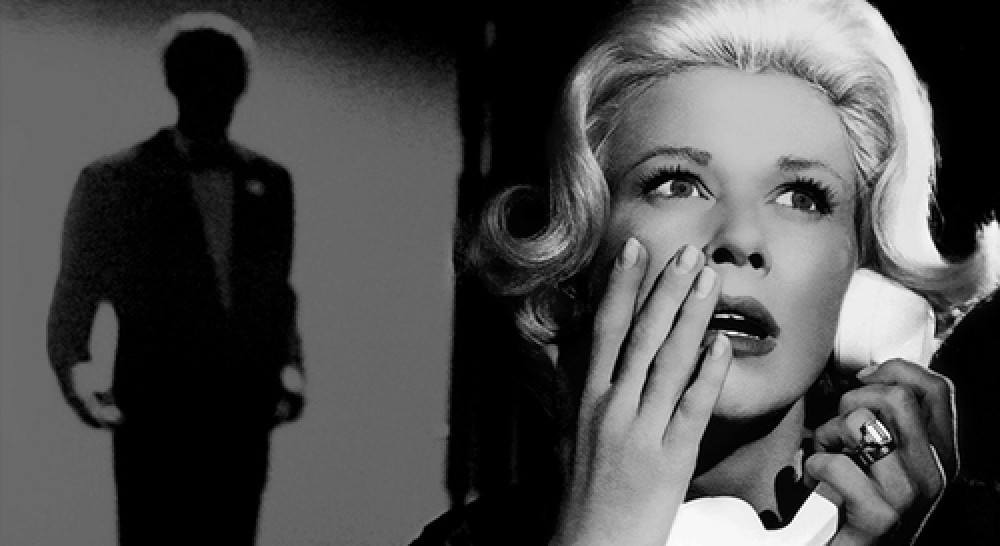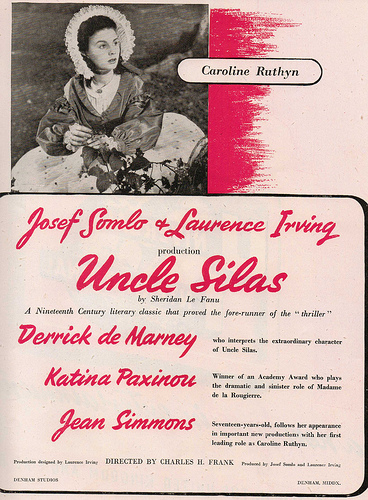We immediately noticed a marked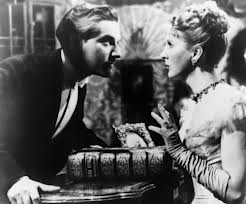 difference between this UK production and the US gothic films we have recently screened. While Rebecca and Notorious were polished, Uncle Silas’ theatricality reminded us of the ‘blood and thunder’ present in the UK version of Gaslight. (See our previous discussion of the latter here: http://blogs.kent.ac.uk/melodramaresearchgroup/2013/04/05/summary-of-discussion-on-gaslight/)
difference between this UK production and the US gothic films we have recently screened. While Rebecca and Notorious were polished, Uncle Silas’ theatricality reminded us of the ‘blood and thunder’ present in the UK version of Gaslight. (See our previous discussion of the latter here: http://blogs.kent.ac.uk/melodramaresearchgroup/2013/04/05/summary-of-discussion-on-gaslight/)
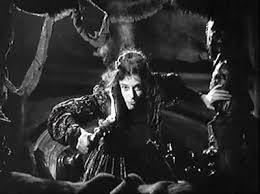 It was also noticeable that neither film really integrated its comedic aspects. In Gaslight much of the comedy was provided by Frank Pettingell’s slightly bumbling policeman. By contrast, Uncle Silas’ criminals – especially the French governess so vividly played by Katina Paxinou – were the main comedy figures. This undercut much of the potential suspense as nefarious plans were threatened by the criminals’ own incompetence.
It was also noticeable that neither film really integrated its comedic aspects. In Gaslight much of the comedy was provided by Frank Pettingell’s slightly bumbling policeman. By contrast, Uncle Silas’ criminals – especially the French governess so vividly played by Katina Paxinou – were the main comedy figures. This undercut much of the potential suspense as nefarious plans were threatened by the criminals’ own incompetence.
Comedy was not restricted to the film’s criminals though, since the set piece of Kathryn’s Cousin Monica’s Christmas party poked fun at the upper classes. This was especially jarring as a key section centred on the difficulty of getting a message to Kathryn about her Uncle Silas’ illness. We might have expected this to provide some suspense. There was only confusion, however, with the communication difficulty resting on the fact party-goers were unable to spread messages without the help of their servants.
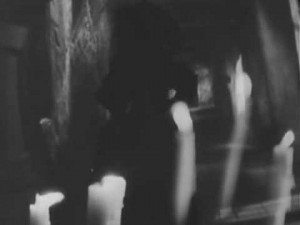 Further confusion for the audience occurred in an extended sequence in which Kathryn was drugged and seemingly accompanied to Dover by her French governess. This too combined drama and comedy. The speed of the train travel well conveyed the high stakes of the situation, but the danger was dismissed by repeated instances of comedy. All the characters were suddenly jolted into action, spoke incessantly, and then fell asleep on at least two occasions. Some of the experimental avant-garde techniques used to convey Kathryn’s drugged state (fuzzy focus etc) were also incongruous when compared to the film as a whole.
Further confusion for the audience occurred in an extended sequence in which Kathryn was drugged and seemingly accompanied to Dover by her French governess. This too combined drama and comedy. The speed of the train travel well conveyed the high stakes of the situation, but the danger was dismissed by repeated instances of comedy. All the characters were suddenly jolted into action, spoke incessantly, and then fell asleep on at least two occasions. Some of the experimental avant-garde techniques used to convey Kathryn’s drugged state (fuzzy focus etc) were also incongruous when compared to the film as a whole.
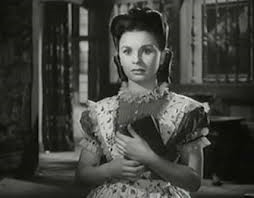 The heroine Kathryn also caused concern. Unlike the criminals she was not a comic figure. But her extreme naivety led to her displaying incompetence similar to that of the other characters. Although it was clear to the audience that her Uncle had a financial motive to want her dead, Kathryn refused to believe this of him. This was even the case after she accidently stumbled across the evidence of his attempts to forge her signature, which led to his subsequent violent relapse of illness. Kathryn was not a courageous spy like Alicia in Notorious, nor was she the quieter but still curious second Mrs de Winter of Rebecca. As a heroine we found her difficult to invest in. While this may be connected to an attempt to display the character’s British reserve, it became less than credible as the film progressed.
The heroine Kathryn also caused concern. Unlike the criminals she was not a comic figure. But her extreme naivety led to her displaying incompetence similar to that of the other characters. Although it was clear to the audience that her Uncle had a financial motive to want her dead, Kathryn refused to believe this of him. This was even the case after she accidently stumbled across the evidence of his attempts to forge her signature, which led to his subsequent violent relapse of illness. Kathryn was not a courageous spy like Alicia in Notorious, nor was she the quieter but still curious second Mrs de Winter of Rebecca. As a heroine we found her difficult to invest in. While this may be connected to an attempt to display the character’s British reserve, it became less than credible as the film progressed.
A point of similarity across UK (Uncle Silas) and US productions (e.g. Rebecca,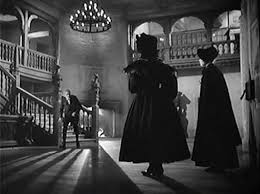 Notorious) was the presence of gothic houses. Uncle Silas began in the large mansion she shared with her father. The action, and Kathryn, soon moved to the dilapidated estate of her Uncle Silas. The distressed state of the latter’s abode was conveyed by direct contrast with another house – Cousin Monica’s provides the backdrop for a lavish Christmas party.
Notorious) was the presence of gothic houses. Uncle Silas began in the large mansion she shared with her father. The action, and Kathryn, soon moved to the dilapidated estate of her Uncle Silas. The distressed state of the latter’s abode was conveyed by direct contrast with another house – Cousin Monica’s provides the backdrop for a lavish Christmas party.
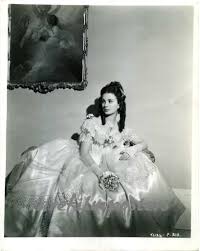 This comparison in the state of residences formed part of the reason for Kathryn’s visit to her cousin. While Kathryn was certainly at liberty to travel to her cousin’s (she had no suspicion of her Uncle’s intentions and was unlikely to pass on a message) the purpose of her visit within the narrative was unclear. It seemed to slow down the action. We also thought the reason might be linked to romance: the visit allowed her to renew acquaintance with a young man she was fond of. It also provided viewers with a sort of ‘makeover scene’ which frequently occurs in romantic films; Kathryn stood in front of a mirror wearing an old dress before twirling and magically donning a beautiful new one. This concern with romance also links the UK and US gothic films we have screened – and indeed to film more generally.
This comparison in the state of residences formed part of the reason for Kathryn’s visit to her cousin. While Kathryn was certainly at liberty to travel to her cousin’s (she had no suspicion of her Uncle’s intentions and was unlikely to pass on a message) the purpose of her visit within the narrative was unclear. It seemed to slow down the action. We also thought the reason might be linked to romance: the visit allowed her to renew acquaintance with a young man she was fond of. It also provided viewers with a sort of ‘makeover scene’ which frequently occurs in romantic films; Kathryn stood in front of a mirror wearing an old dress before twirling and magically donning a beautiful new one. This concern with romance also links the UK and US gothic films we have screened – and indeed to film more generally.
As ever, do log in to comment or email me on sp458@kent.ac.uk to add your thoughts.
